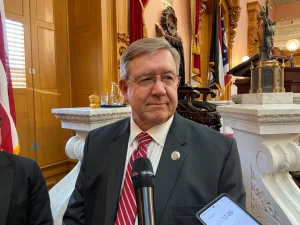News
Ohio House leaders discuss some of the year’s most controversial bills
By: Andy Chow | Statehouse News Bureau
Posted on:
COLUMBUS, Ohio (Statehouse News Bureau) — After redistricting and elections took up a large chunk of lawmakers’ time this year, the Ohio House was left with a few heated debates.

Arguments started early in the session, and the issue only picked up more steam after the U.S. Supreme Court overturned Roe v. Wade in the June ruling of the Dobbs v. Jackson case.
But despite all the talk over new legislation, nothing passed.
“My guess is it didn’t happen because there are some very extreme perspectives within the caucuses of both chambers that want to do things like ban procedures and birth control at conception, want to make it difficult for families to get access to in vitro fertilization treatments,” said House Democratic Caucus Leader Allison Russo (D-Upper Arlington).
House Speaker Bob Cupp (R-Lima) attributed the lack of action to a still-developing consensus of where exactly Ohio wants to land.
“Two states, Indiana and West Virginia, have passed bills banning abortion since the Dobbs decision and they have all included very time-limited and short-term exceptions for rape or incest. So that may be the way for them, it may not be the way for it. It’ll be the next General Assembly that decides that,” said Cupp.
The legislature weighed two paths for new abortion policy. One was a total abortion ban and the other was new language to clarify the state’s existing six-week abortion ban.
Both Russo and Cupp acknowledge that the issue could come down to a citizen’s initiative, where voters would decide if they want to enshrine abortion rights in the Ohio constitution through a ballot issue.
That relates directly to another issue the House spent a lot of time arguing over: a resolution about constitutional amendments.
Currently, to change the constitution, a simple majority of voters need to approve a ballot measure. A proposal that would have raised that threshold to 60% failed, but Cupp says Republicans hope to take it up next year.
“There is concern in a general sense that certain well-funded groups can essentially hijack the constitution by proposing an amendment and getting the majority to support it and putting out-of-state money behind it. And so, there’s been a concern for a long time about it. It has now surfaced in this. And I think because it came so late in the session, a lot of members are still trying to think about what are the implications of this,” Cupp said.
Russo said there’s a large contingency of opponents ready to fight against that resolution.
“That issue is deeply unpopular on both sides of the political spectrum, and citizens should be hugely concerned about it, because it does block their access to direct democracy,” Russo said.
Cupp is term-limited. Rep. Derek Merrin (R-Monclova Twp.) will take over as House speaker in the next general assembly. He’ll inherit a supermajority, and Cupp hopes leaders will prioritize transparency.
“I think it’s important to do things above board. Clearly, I think public officials have a higher standard that they need to follow in terms of fulfilling the public trust,” Cupp said. On the other hand, Russo will again be leading a super minority next year with just 32 members in her caucus.
“So we will be small, but we will work smartly and we will continue to make impact where we can. And listen, in spite of our small numbers, we’ve been able to be effective in some important ways and sometimes that’s blocking really bad things from happening. But it’s also about knowing how to work the legislative process and build those relationships to be able to get things done,” said Russo.
That may be even more important as lawmakers head into the biennium budget process.

